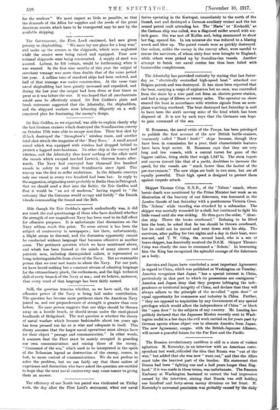Still, the question remains whether, as we have said, the
full offensive power of the Navy is being laid under contribution. The question has become more pertinent-since the American Navy joined us, and our preponderance of strength is greater than ever before. No sane person suggests that our ships should be thrown away on a hostile beach, or should steam under the steel-plated- headlands of Heligoland. The real question is whether the theory of naval warfare which became fashionable about ten years ago has been pressed- too- far or is wise and adequate in itself. This theory assumes that the larger navel operations must always have for their object " passage and communication." In other words, it assumes that the Fleet must be mainly occupied in guarding our own communication, and seizing those of the enemy. "Command of the sea," which used to be interpreted in the spirit of the Nelsonian legend as destruction of the enemy, comes, in fact, to mean control of communications. We do not profess to solve the problem; but we can fairly say that those sailors of experience and distinction who have asked the question are entitled to hope that the next naval controversy may come nearer to giving them an answer.


































 Previous page
Previous page